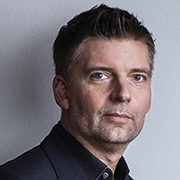Matthias Pintscher has composed idyll, a new orchestral work with piano for the Cleveland Orchestra. The composer has created a music of great brightness and lightness based around an earlier solo piano work.
Matthias Pintscher has composed an “idyll” for the Cleveland Orchestra, a shining, light image of a place of yearning. A composition which takes space and time for the music to resonate. “The piece is about the breathing of resonances, about fading away – with the whole sense of longing associated with this. Each sound dies away because it is dependent upon the breath, and then you have to breathe in anew. That is the theme of this piece.” The composition is a kind of “tombeau”, or memorial, for a friend and mentor who has recently died. In his orchestral work Matthias Pintscher builds an “altar” around a piano composition which he composed for his friend’s 80th birthday in 2004: on a clear day draws horizontal axes around a central note, E flat, with fragile, filigree symbols. This horizon, a graphic perspective which emerges from intervals, harmonies and the tonal aura of the glassy piano sound “is the starting point for a much larger orchestral expanse which I have built around this piano piece”, says Matthias Pintscher. That is, the orchestra breathes a similar expanse which the piano piece describes. A music of great brightness and lightness is created, supported by perspective and hope. As in a dream of being a bird or being weightless, it is about a longing for lightness, about visions of light, inspiration and clear forms.”
In a very fine, transparent colourfulness, the orchestral parts are given space to weave threads. Solo instruments repeatedly traverse the movement, which is shaded by carefully woven combinations of instruments in a development which strides towards the “coup” of the solo piano entry. As in a picture which is viewed from a distance, Idyll describes a wandering to a bright, imaginary place, “as if we are striding through the garden of memory where we apparently come to a clearing, but turn away from this and take another path. The orchestra describes a large soundscape with inner emotional landscapes which outline it.” But for the vision of brightness, it needs the experience of darkness. Amongst the large, light structures of comprehensible beautiful and transparent sound lies a space of darkness, of sadness, of shadow.
Marie Luise Maintz
(from [t]akte 2/2014)



